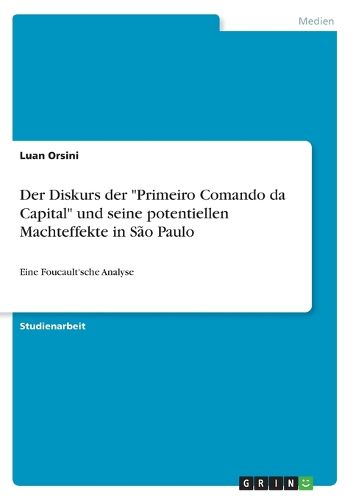Readings Newsletter
Become a Readings Member to make your shopping experience even easier.
Sign in or sign up for free!
You’re not far away from qualifying for FREE standard shipping within Australia
You’ve qualified for FREE standard shipping within Australia
The cart is loading…






Studienarbeit aus dem Jahr 2010 im Fachbereich Medien / Kommunikation - Interkulturelle Kommunikation, Note: 1,0, Europa-Universitat Viadrina Frankfurt (Oder), Veranstaltung: Michel Foucaults kleine Schriften, Sprache: Deutsch, Abstract: The discourse of the Primeiro Comando da Capital (PCC), an anti-establishment Brazilian criminal organization, represents an example of what Foucault calls a counter-discourse - one which rejects fundamental ideas present in the dominant discourse to create a reality which is ignored by most people in a society. This paper, based mainly on the Foucaultian concept of genealogy, on the work of sociologist Teresa Caldeira about the dominant discourse in Sao Paulo and on the work of the journalist Fatima Souza about the PCC, analyses the group’s discourse under the perspective of Foucault’s work and raises questions about the validity of his findings in the light of a practicle example.
$9.00 standard shipping within Australia
FREE standard shipping within Australia for orders over $100.00
Express & International shipping calculated at checkout
Studienarbeit aus dem Jahr 2010 im Fachbereich Medien / Kommunikation - Interkulturelle Kommunikation, Note: 1,0, Europa-Universitat Viadrina Frankfurt (Oder), Veranstaltung: Michel Foucaults kleine Schriften, Sprache: Deutsch, Abstract: The discourse of the Primeiro Comando da Capital (PCC), an anti-establishment Brazilian criminal organization, represents an example of what Foucault calls a counter-discourse - one which rejects fundamental ideas present in the dominant discourse to create a reality which is ignored by most people in a society. This paper, based mainly on the Foucaultian concept of genealogy, on the work of sociologist Teresa Caldeira about the dominant discourse in Sao Paulo and on the work of the journalist Fatima Souza about the PCC, analyses the group’s discourse under the perspective of Foucault’s work and raises questions about the validity of his findings in the light of a practicle example.